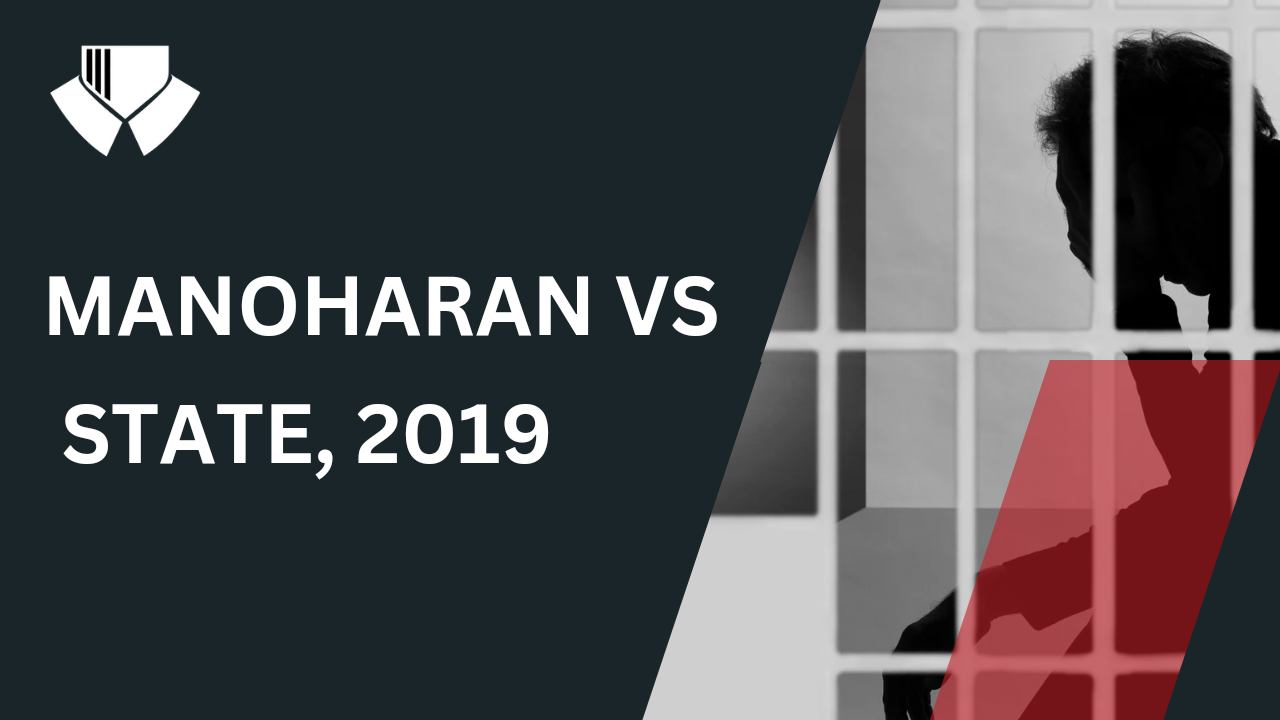This case analysis is written by ASHAFAK HUSEN, student of D.D.U. Gorakhpur, University, Gorakhpur, Uttar Pradesh.
Citations: 7 SCC 716
Bench: Rohinton Fali Nariman, Sanjiv Khanna, Surya Kant
Date of Judgment: 7 November, 2019
Petitioner: Manoharan Vs Respondent: State by Inspector of Police
Background / Facts
In this case, Manoharan, the petitioner, was convicted under various sections of the Indian Penal Code (IPC) for his involvement in a heinous crime that took place on October 29, 2010. The case involved the abduction, rape, and murder of two school-going children, a girl, and a boy. The children’s bodies were found in a canal, and the investigation led to the arrest of Manoharan and another accused.
The prosecution’s case was primarily built on circumstantial evidence, including Manoharan’s confessional statement, which he later retracted during the trial. The trial court convicted him, and the High Court upheld the conviction and imposed the death penalty.
Manoharan filed an appeal before the Supreme Court, challenging the High Court’s decision. The case involved several legal issues, including the admissibility of confessional statements, the sufficiency of legal representation, and the application of various sections of the IPC, including Section 376 (related to rape).
The Supreme Court reviewed the evidence, considered legal arguments, and ultimately upheld Manoharan’s conviction for various offenses. The case raised questions about the standards for legal representation, the use of confessions in criminal trials, and the appropriateness of the death penalty in certain cases.
Issues involved
Admissibility of Confessional Statements: A significant issue was the admissibility of Manoharan’s confessional statement and its subsequent retraction. The court had to determine whether the confession was voluntary and,- reliable,- and whether the retraction affected its credibility.
- Adequacy of Legal Representation: The petitioner argued that he had not received adequate legal representation, raising questions about his right to effective legal assistance under Article 21 of the Indian Constitution. The court had to assess whether the legal aid counsel provided to the petitioner was sufficient.
- Conviction under IPC Sections: The case raised the issue of whether the petitioner’s conviction under various sections of the Indian Penal Code (IPC), including Section 376 (related to rape), was justified based on the evidence presented.
- Death Penalty: The court had to consider whether the imposition of the death penalty was appropriate, given the nature of the crime, the petitioner’s role, and the presence of mitigating factors.
- Use of Circumstantial Evidence: The case involved significant reliance on circumstantial evidence. The court had to determine whether the prosecution had established guilt beyond a reasonable doubt based on the circumstantial evidence presented.
- Retrospective Application of POCSO Act Amendments: The petitioner challenged the retrospective application of amendments to the Protection of Children from Sexual Offences (POCSO) Act in determining the sentence. The court had to address whether these amendments could be applied in this case, which predated the amendments.
Contentions
Contentions of the Petitioner (Manoharan):
The petitioner contested his conviction and death sentence on several grounds. Firstly, he argued that his confessional statement was obtained under duress and was not voluntary. He claimed that he had been coerced into making the confession by the police. Secondly, the petitioner asserted that he did not receive adequate legal representation during the trial, violating his constitutional right to effective legal assistance.
He argued that the legal aid counsel appointed for him was insufficient. Thirdly, he contended that he had been wrongly convicted under Section 376 of the IPC, as the confessional statement indicated a different offense under Section 377. Moreover, he challenged the use of circumstantial evidence in his conviction, asserting that there were doubts and discrepancies in the case. Finally, he objected to the retrospective application of amendments to the POCSO Act for determining his sentence, arguing that this was unconstitutional.
Contentions of the Respondent (State):
The state, represented by the Inspector of Police, Variety Hall Police Station, Coimbatore, maintained that the petitioner’s confessional statement was voluntary and reliable. They argued that the statement had not been obtained through coercion or intimidation. The state also contended that the petitioner had received adequate legal representation during the trial through legal aid counsel.
They emphasized that the evidence, including circumstantial evidence and the victim’s injuries, supported the conviction under Section 376 of the IPC. Additionally, they argued that the retrospective application of amendments to the POCSO Act was valid and that the case warranted the death penalty due to its gruesome and heinous nature.
Judgment
In the judgment of Manoharan v. State, the Supreme Court of India dismissed the review petitions challenging the conviction and death sentence of the petitioner, Manoharan. The court reaffirmed its earlier decision upholding Manoharan’s conviction under Sections 302, 376(2)(f) and (g), and 201 of the Indian Penal Code.
The court addressed several key issues raised by the petitioner, including the voluntariness of his confessional statement, the adequacy of his legal representation, and the retrospective application of amendments to the Protection of Children from Sexual Offences (POCSO) Act. The court rejected the petitioner’s arguments, finding that his confession was voluntary, he received adequate legal representation, and the amendments to the POCSO Act could be applied in this case.
The court also emphasized the gruesome and heinous nature of the crimes committed by the petitioner, which involved the abduction, rape, and murder of two school-going children. The court held that these offenses constituted the rarest of the rare cases, justifying the imposition of the death penalty.
Conclusion
In the case of Manoharan v. State, the Supreme Court of India, after careful consideration, dismissed the review petitions filed by the petitioner, Manoharan. The court reiterated its earlier decision to uphold Manoharan’s conviction under Sections 302, 376(2)(f) and (g), and 201 of the Indian Penal Code.
The judgment reaffirmed the court’s findings on various issues, including the voluntariness of Manoharan’s confessional statement, the adequacy of his legal representation, and the retrospective application of amendments to the POCSO Act. The court held that the confession was voluntary, legal representation was adequate, and the amendments could be applied in this case.
Crucially, the court underlined the horrifying nature of the crimes committed by Manoharan, which involved the abduction, rape, and murder of two innocent school-going children. The court unequivocally declared these acts as constituting the rarest of the rare cases, justifying the imposition of the death penalty.
The Supreme Court upheld Manoharan’s conviction and the death sentence, firmly standing by its earlier decision. The judgment emphasized the severe gravity of the offenses and the imperative for a strong judicial response in such heinous cases to ensure justice and deterrence.
Reference:
- Indian Kanoon, https://indiankanoon.org/doc/159073234/ (last visited September 15th, 2023)
- Live Law, https://www.livelaw.in/pdf_upload/pdf_upload-366347.pdf ((last visited September 15th, 2023))


